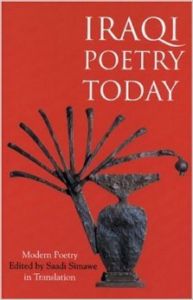For two decades, since the Iraq-Iran war in 1980, Iraq has been the focus of numerous political, economic, sociological, military, and geopolitical studies. However, very little has been published on the Iraqi literary tradition. Modern Iraq has produced a highly complex literature of survival in response to various realities of oppression and to challenges of modernism.
Translators include Naomi Shibab Nye, Ellen Dore Watson, Daniel Weissbort, and Ferial Ghazoul.
Dr. Saadi Simawe guest-edited the pioneering Palestine/Israel issue of Modern Poetry in Translation (No. 14), and three years ago guest-edited a special issue of Arab Studies Quarterly on modern Iraqi literature. He is Associate Professor of Middle Eastern and American Studies, Grinnell University.
Reviewed by: Jeffrey Alfier, Schwedelbach, Germany
What of the known world and its days have you lost?
Muzaffar al-Nawwab, 'Bridge of Old Wonders'
Paul Fussell once described British soldier-poet Edmund Blunden's decision to write the autobiography of his war years as 'memory conceived as an act of reconnaissance'. In Iraqi Poetry Today, the nineteenth in a series of the publisher's Modern Poetry Translations, one finds a spirit kindred to Blunden, even though for most Iraqis, war and loss are not events solely relegated to the haunting past; instead, the events are ongoing and in most cases are inherited parts of their futures. It was thus the hope of co-editors Saadi Simawe and Daniel Weissbort that a new translation of Iraqi poetry into English would contribute to the appreciation and cause of peace in the Middle East. Though they believe their dream has been disappointed in the current atmosphere of violence, they still find an abiding faith in the endurance of the poetry they compiled in this anthology of forty poets. Hence, theirs is a serious attempt to "save what remains of Iraqi humanity and culture in the face of dictatorship and war" (5). Under the current turmoil of post-war Iraq Simawe and Weissbort's compilation is needed more urgently than ever.
Structurally, the book is arranged alphabetically by the poets' last names. As an interpretive aid, many of the poems have notes at the end which assist the non-Arab and non-Islamic reader in interpretation and meaning. The Kurdish poems are noted as such under individual titles. Included in the prefatory material is a brief introduction to Kurdish poetry by Muhamad Tawfiq Ali. The book closes with two commentaries, one on Fadhil al-Azzawi's German poems, and another on Egyptian poet Muhammad Afifi Matar's long poem, 'Quartet of Joy.' These two additions offer absorbing discussions of the translation process between Arabic, English, and German. There are also biographies of the translators as well as the poets, a feature that helps to inform the context of the poems. Simawe and Weissbort are not the only translators for there are many others, including the poets themselves. At the time of printing, all but five of the poets lived in Western exile.
